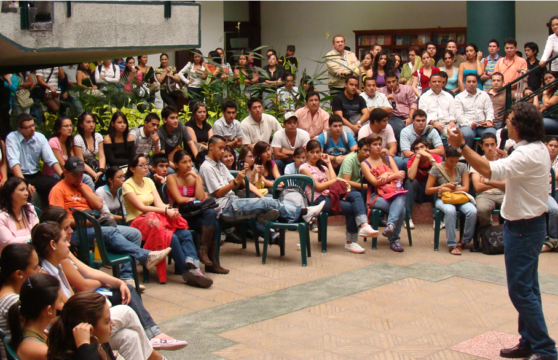
Achieving World Class Education in Brazil
An analysis of Brazilian education and the four recommendations offered to better compete with OECD systems by 2021.
This post is also available in: Spanish
Whose advice should education decision-makers in Latin America—and in middle-income countries in general—be taking? In an interesting initiative, Fernando Reimers has compiled a book of letters and recommendations to ministers and decision-makers in education (Letters to a New Minister in Education: Learning to Lead Education Systems). The Dialogue’s Education program had the opportunity to speak with Otto Granados Roldán, former secretary of education in Mexico, who authored one of the chapters in the book. We discussed two areas in particular: policy and politics.
Every new minister wants to make an impact on education policy in the first days of his or her administration. The question of when and how to do so seems fundamental to the process. What can you say about the possibilities and limitations of the public policies and programs that new ministers may wish to implement?
To begin, I would like to point out that being an education minister is like walking a tightrope. You walk slowly, step by step on the tightrope, without a safety net, and like De Musset said, never knowing if you are walking over the ashes of the past or the seeds of the future. Here are some examples: in Mexico in the last 50 years only two out of eighteen ministers have served their full six-year term. Also, between 1988 and 1993, there were nine different ministers in Peru; six in Brazil, five in Colombia and Venezuela, four in Chile, and three in Argentina, Spain and Mexico. Between 2000 and 2014 there were eight in France and twelve in Japan.
Even now, things have not changed much: between the years 2000 and 2015 the average term served by a minister in Latin America and the Caribbean was two years and a month. And in 2019, the recently appointed minister of education of Brazil only lasted ninety-eight days. In the region, there are only two exceptions: a fantastic Colombian minister who lasted eight years and the current Bolivian minister who has been in the position for eleven years.
I think that the great instability in leadership concerning education administrations leads to two lessons that consist of the need to be realistic and know how to establish meaningful priorities. In other words, every new government has natural, practically inherent, tendencies to maximalism and trying to reinvent the country. They want radical changes within the timeframe of a short presidential term where, presumably, there is no (or there should not be) reelection. There is a youthful spirit that feeds the belief that everything counts, everything is possible, and that with political will alone things can change instantaneously. I remember how, when the socialists won in Spain in 1982, one of the new ministers—I think Carlos Solchaga—promised that they would change the country to such a degree that it would become unrecognizable [“cambiaremos al país a tal grado que no lo reconocerá ni la madre que lo parió”]. Many things changed for the better, others did not.
In education, and even other fields of public policy, it is not possible to accomplish such changes for a series of reasons and because education policy reforms are complex processes marked by long and slow maturation. Therefore, from the beginning, a good minister must ask himself or herself the right questions regarding school coverage, education quality or social and economic mobility, among other things, and calculate how they want to be seen when they leave the position. In other words, what do they want to accomplish by the end of the term and how will they document it with hard facts that are measurable. Ultimately, they should ask themselves what kind of legacy they want to leave behind. This is what people will ask, what they will be evaluated on, and how they will be judged by the following administrations.
Many times, education policy and programs progress slowly which can exasperate and divide the motivation of decision makers. What recommendations would you offer in defining a ministry’s priorities?
Starting about two decades ago, when international and national tests and evaluations were introduced, now every ministry goes through a depressive phase every time the results are published, and their countries do not come out on top. Clearly, every minister would like to reach top scores during their term, which can generate political dividends. Unfortunately, things do not occur that way for a multitude of reasons. One is that really changing the education system of a country takes a long time, at least 25 to 30 years, and there is no political cycle that can withstand that. However, another more relevant reason is that the goal of a good education system, one with quality and relevance, is not improved scores on these tests or on learning achievements; rather that the education actually allows for social and economic mobility of the students and for increases in the productivity and competitiveness of the country. This can only be seen with long-term, robust evidence and not through periodic test scores.
Also, it is important to be conscious of the fact that a minister of education is not a powerful official like some others who, for example, handle the budget, national security, or the inner circle that always surrounds the president. Latin American education ministers only have vicarious power; they are disposable, and their power usually derives from the few moments in which they gain moral, and consequently political, authority. That is the only way. A minister that wants to make a difference should use the power that he or she gets from their initial credibility at the beginning of their term in order to make difficult and efficient, albeit frequently unpopular, decisions, such as trying to stop union corruption in the education sector or introducing new rules for teachers’ professional careers and development.
Certainly, another option is to make populist decisions, based generally on political expediency, but which are bad for education. Here, there is no reason to have false illusions that these actions will achieve substantive changes just because of their wishful thinking. This does not exist in politics, and there is a plethora of examples. Of the hundreds of education reforms that have been implemented in the last fifty years in numerous countries, of varied nature and scale, it is rare to find one that did not provoke any tension or conflict. Simply put, almost all these reforms touch corrupt stakeholders such as unions, bureaucracies, political parties, legislators and civil society groups.
Moreover, reforms without conflict are not true reforms. If you are trying to make structural or systemic reforms in education, the moment is crucial because in education policy opportunity doesn’t knock twice and the stakeholders, sooner or later, will always look to retain what they consider to be their sphere of influence, and above all in the most venomous are the unions. Those with power never relinquish it voluntarily and, as Kant said, in it is human nature to not want to give up one’s control.
Another important aspect of working in the education field is politics. The decision-maker must know strategies that facilitate administration, for example, in the presidential cabinet. What best practices would you recommend in order to collaborate with other ministers/secretaries and even the president?
Every cabinet is an archipelago of ambitions more than a united continent of policies, and if someone wants to be a good education minister, it is better to put aside any personal political aspirations, at least at the beginning. If things go well and you have good delivery, with some luck you might have a political future. In education, it is a bad idea to make decisions solely based on a political calculation, because then you do not achieve anything substantive.
Furthermore, if you, as the minister of education, put aside your aspirations, or at least pretend to, it gives you an advantage against your fellow cabinet members. They won’t see you as a political threat, but rather as a friend and colleague, resulting in them supporting your work.
I believe there are two actors that should be key allies. One, of course, is your boss, whom should be convinced of your vision on education policies so you can be assured of all his or her support in a moment of crisis and ask that he or she respect your decisions. If the president does not support you, if he or she wants to impose inefficient solutions that are absurd and restrict your free will, it means that as a minister, you have lost. Your boss always thinks he or she knows more, either because he does not want the same things or because he or she does not care what you recommend. If that is the case, then it is better that you, the decision-maker, pack your bags before you end up destroyed and utterly discredited.
The other ally is the minister of finance. For this person, education is their fourth or fifth priority, but for you, the finance minister is your most important ally because changes in education need effective budget allocations.
In that same vein, another important element of politics is one’s constituency and their opinions about the programs and projects. What elements should be considered in order to favorably appeal to public opinion and receive support for the projects initiated by the decision-maker?
The challenge as a minister is to coordinate political, media and civil society coalitions that must accept that, if you are going to make substantive changes, the least important consideration is short term stability, and it is worth the struggle to even if there may be challenges in the implementation process. On other hand: if the reforms that are being introduced shake the hornet’s nest, it means that they are moving in the right direction, and the minister should try to create the right incentives so that the citizenry can support them despite the complexity of the reform. This way, we can provide positive results in some components of the reform as quickly as possible.
Also, it is important, to be honest with the public from the beginning. Meaning, if what you want is that at the end of your term, educational reform is relatively visible in terms of learning achievements as well as evaluations, socio-economic mobility, or the general perception that things are improving, you have to be realistic about what you can achieve in a few years. It is true that early victories are very useful, but you have to be mindful that it takes many, many years and multiple administrations to construct an excellent education system that might eventually become one of the best in the world. Promising otherwise is lying to the people and, even worse, to yourself.
Finally, a key actor in the implementation of policies and programs is the teachers themselves (and the teacher unions). What should be taken into consideration regarding the political power of the teachers to develop projects and education policies?
This is a very sensitive subject that puts to the test all the mechanisms with which the ministry might move forward quickly (or which can cause it to fail spectacularly). I’ll put it like this: the education systems or, more accurately, the bureaucratic or union structures that comprise them, of emerging countries are, by definition, very conservative. They are used to the status quo, living inside an ecosystem where they thrive, on occasion in a scandalously corrupt fashion, with regards to entry into the profession, the careers of the teachers, the administration of schools, and the public budgets, among other things.
It is not verifiable that teachers are defenseless and depend on the goodwill of governments to be able to progress in their professional development. This is not true. At the beginning of every government, they give a tear-jerking speech to illustrate the supposed uphill struggle of their profession in order to make incoming officials sympathetic to their cause. This always happens, but it is curious that nobody—or almost nobody—abandons the teaching profession, and not because of that “suffering servant” which sounds good in rhetoric but doesn’t reflect reality.
In general, I would say that all the teacher unions in Latin America, although not necessarily the actual teachers in the classroom, oppose reforms because these changes alter the very corporate modus vivendi whereby they are mediators between the government and the teachers. Therefore, it is imperative to find the legal, political, and institutional mechanisms that give the state true stewardship in the administration of the education system. It is also necessary to accrue high levels of social and political support to be able to manage the conflict that is all but inevitable with large-scale reforms.
That is to say, one must intensify the dialogue as far as possible, not be alarmed by protests, and stay rooted in fundamentals and policies that are non-negotiable. On the other hand, if you concede and make the policy vulnerable to changes and reforms out of fear of the union leaders, you can avoid the conflict, but it is a loss for education, for the true teachers, and most of all for the children.
An analysis of Brazilian education and the four recommendations offered to better compete with OECD systems by 2021.
An interview with Sergio Fajardo: better understanding the role of political leadership in effective educational policies.
An analysis of global trends and their impact on education policies in Chile.

